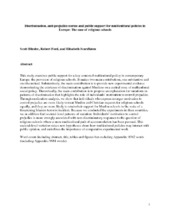Discrimination, Antiprejudice Norms, and Public Support for Multicultural Policies in Europe: The Case of Religious Schools
Peer reviewed, Journal article
Accepted version
Permanent lenke
https://hdl.handle.net/1956/23095Utgivelsesdato
2019Metadata
Vis full innførselSamlinger
Originalversjon
https://doi.org/10.1177/0010414019830728Sammendrag
This study examines public support for a key contested multicultural policy in contemporary Europe: the provision of religious schools. It makes two main contributions, one substantive and one theoretical. Substantively, the main contribution is to provide new experimental evidence demonstrating the existence of discrimination against Muslims on a central issue of multicultural social policy. Theoretically, the main contribution is to propose an explanation for variations in patterns of discrimination that highlights the role of individuals’ motivation to control prejudice. Through moderation analysis, we show that individuals who express stronger motivation to control prejudice are more likely to treat Muslim and Christian requests for religious schools equally, and they are more likely to retain their support for Muslim schools in the wake of a threatening Islamist terrorist incident. Because we conducted the experiments in three countries, we in addition find societal-level patterns of variation: Individuals’ motivation to control prejudice is more strongly associated with nondiscriminatory responses to the question of religious schools where a more multicultural path of accommodation has been pursued. This societal-level variation raises new hypotheses about how multicultural policies may interact with public opinion and underlines the importance of comparative experimental work.
